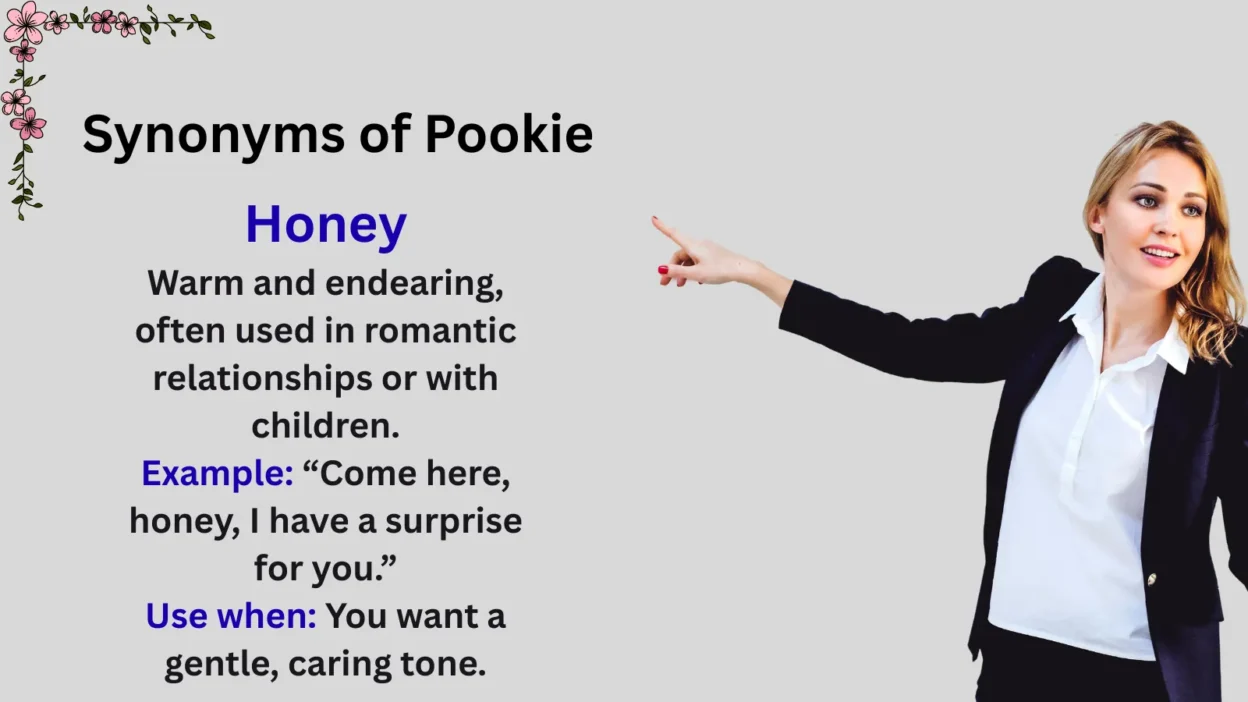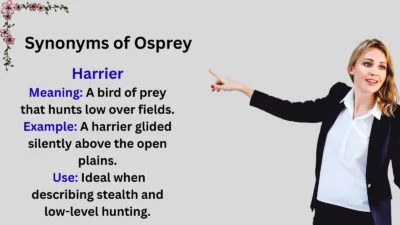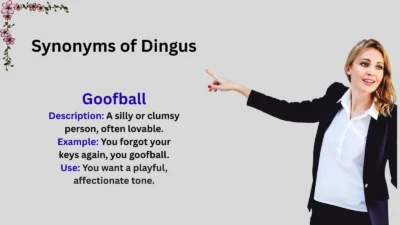Synonyms of Pookie, such as sweetheart, babe, honey, and cutie, show warmth, love, and affection toward someone special. For example, “sweetheart” feels tender and classic, while “cutie” sounds playful and modern. Each synonym captures a different tone of endearment—from romantic to friendly to family love.
If you’re writing about relationships, texting slang, or affectionate nicknames, choosing the right synonym for pookie helps set the perfect mood and connection, like Situationship.
These synonyms of pookie not only make your writing or messages more expressive but also reveal how language shows love and care. From social media to real-life conversations, these words keep affection simple, sweet, and heartfelt.
What Does Pookie Mean?
Pookie is a cute nickname used to show love or affection for someone special—like a partner, close friend, or even a pet. It often means:
- Sweetheart or someone you love deeply
- A term of endearment in relationships
- Playful or loving nickname
- Expression of closeness and care
It’s not just a word—it’s a feeling of warmth and affection. Pookie turns simple moments into something cozy, loving, and full of heart.
Synonyms & Related Words for Pookie (And When to Use Them)
1. Sweetheart
A classic term of affection, suitable for almost any loving relationship.
Example: “Good morning, sweetheart! Did you sleep well?”
Use when: You want a traditional, heartfelt expression.
2. Honey
Warm and endearing, often used in romantic relationships or with children.
Example: “Come here, honey, I have a surprise for you.”
Use when: You want a gentle, caring tone.
3. Love
Simple and direct, it conveys deep affection.
Example: “I missed you today, love.”
Use when: You want to express intimacy without playful overtones.
4. Babe
Trendy and casual, often used between partners.
Example: “Babe, can you grab me a coffee?”
Use when: You want modern, informal intimacy.
5. Baby
Similar to “babe,” but can feel slightly more tender or protective.
Example: “Don’t worry, baby, everything will be fine.”
Use when: Expressing care or reassurance.
6. Sweetie
Playful and friendly, it can be used with loved ones of any age.
Example: “Thanks for helping me, sweetie!”
Use when: You want light-hearted warmth.
7. Cutie
Fun and flirty, it emphasizes charm or attractiveness.
Example: “You look adorable today, cutie.”
Use when: Complimenting appearance or playful behavior.
8. Snugglebug
Whimsical, ideal for cozy or affectionate moments.
Example: “Come here, snugglebug, let’s watch a movie.”
Use when: Emphasizing cuddly, intimate bonding.
9. Lovebug
Playful and cute, often used in romantic or parental affection.
Example: “Sleep tight, my little lovebug.”
Use when: Expressing light, affectionate teasing.
10. Angel
Conveys admiration and endearment, often spiritual or heartfelt.
Example: “You’re my angel, thank you for always being there.”
Use when: Highlighting goodness or emotional significance.
11. Darling
Classic and timeless, suitable for both formal and casual contexts.
Example: “Darling, let’s have dinner together tonight.”
Use when: Adding sophistication to affection.
12. Pumpkin
Cute and playful, common in family and romantic contexts.
Example: “Goodnight, pumpkin, sweet dreams.”
Use when: Creating a cozy, informal atmosphere.
13. Sugarplum
Whimsical, charming, and slightly old-fashioned.
Example: “You’re my sugarplum, always brightening my day.”
Use when: Adding a nostalgic or playful tone.
14. Snookums
Playful and slightly silly, it conveys strong affection.
Example: “I missed you so much, snookums!”
Use when: Light-hearted, informal intimacy.
15. Babycakes
Fun and affectionate, evokes warmth and sweetness.
Example: “You did great today, babycakes!”
Use when: Expressing playful encouragement.
16. Buttercup
Cute, gentle, and slightly whimsical.
Example: “Come here, buttercup, I need a hug.”
Use when: Creating a light, cheerful mood.
17. Sweetpea
Tender and playful, often used with children or romantic partners.
Example: “Sweetpea, don’t forget your backpack.”
Use when: Combining care and intimacy.
18. Lovey
Simple and casual, it conveys affection without grandiosity.
Example: “Thanks for helping, lovey!”
Use when: Expressing everyday warmth.
19. Peaches
Endearing, fruity, and playful nickname.
Example: “You’re the sweetest, peaches.”
Use when: Playfully complimenting someone’s personality.
20. Boo
Short, trendy, and affectionate, common in modern romantic slang.
Example: “Boo, let’s go see a movie.”
Use when: Casual, flirty, or urban contexts.
21. Darlin’
Informal variant of “darling,” often regional (Southern US).
Example: “Darlin’, let me help you with that.”
Use when: Adding a charming, informal tone.
22. Cherub
Evokes innocence, cuteness, and tenderness.
Example: “Sleep tight, my little cherub.”
Use when: Highlighting adorable or angelic qualities.
23. Muffin
Sweet, playful, and cozy, often used in intimate relationships.
Example: “Good morning, muffin, breakfast is ready.”
Use when: Creating a comforting, affectionate vibe.
24. Snugglepuff
Whimsical and fun, perfect for affectionate playfulness.
Example: “Come here, snugglepuff, time for cuddles.”
Use when: Emphasizing cute, cozy moments.
25. Honeybun
Classic, affectionate, and a little whimsical.
Example: “Don’t forget your coat, honeybun.”
Use when: Mixing warmth and playfulness.
26. Bunny
Cute, playful, and soft, often used in romantic or familial contexts.
Example: “Hop over here, bunny, I need a hug.”
Use when: Adding playful, endearing charm.
27. Cookie
Sweet and friendly, it evokes a sense of warmth and comfort.
Example: “You’re my favorite cookie, always making me smile.”
Use when: Highlighting affection with a fun tone.
28. Dove
Gentle, peaceful, and tender, often romantic or poetic.
Example: “You’re my dove, always calming me down.”
Use when: Conveying soft, loving admiration.
29. Cuddlebug
Playful and warm, it emphasizes physical closeness and affection.
Example: “Come here, cuddlebug, let’s watch the sunset.”
Use when: Highlighting cozy, intimate bonding.
30. Snugaboo
Whimsical, fun, and affectionate, perfect for casual intimacy.
Example: “You’re my snugaboo, always making me laugh.”
Use when: Adding playful creativity to your terms of endearment.
How to Choose the Right Synonym
Choosing the right synonym for “Pookie” depends on context, tone, and the relationship you share:
- Emotional Tone:
- For deep affection: Sweetheart, Darling, Love, Angel
- For playful intimacy: Snugglebug, Babycakes, Snookums
- For flirtation: Cutie, Babe, Boo
- Formality:
- Formal or poetic: Darling, Dove, Angel
- Casual or modern: Babe, Baby, Lovey
- Whimsical or fun: Snugaboo, Sugarplum, Snugglepuff
- Audience:
- Romantic partners: Most of these terms work, with emphasis on playful or intimate choices.
- Children: Sweetpea, Muffin, Cherub, Buttercup
- Close friends: Boo, Babe, Cutie
- Cultural Nuance:
- Regional or generational preferences may make some terms more common, like Darlin’ in Southern US contexts or Boo in modern urban slang.
Conclusion
In summary, “Pookie” has a variety of playful and affectionate alternatives you can use depending on the context. From sweet nicknames like “Honey” and “Sweetie” to quirky or humorous options like “Snugglebug” or “Cuddlebug”, each synonym adds its own tone and personality to your message.
Choosing the right one ensures your words feel genuine, fun, and suited to your relationship or conversation.
By understanding these alternatives, you can express affection creatively while keeping your communication fresh and engaging.



